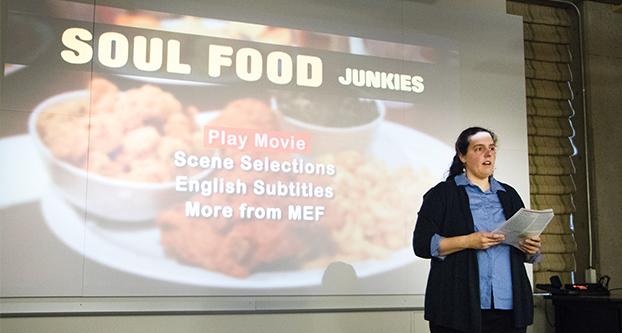Think about your favorite food.
Why is it so special? Are there memories attached to that meal? Is there a tradition associated with it that makes it so special?
The Food Justice Series at Fresno State is taking a closer look at food culture and encouraging students to think about their food beyond calories and nutrition.
This year’s Food Justice Series kicked off with a screening of the documentary “Soul Food Junkies” on Feb. 3 in the library. The film tells the story of a man who decided to trace soul food to its roots and find out why unhealthy comfort foods are such a staple in black communities.
After the film, Dvera Saxton, an anthropology professor, lead a discussion which touched on topics like access to food and how food affects individual cultures.
“[The film] makes you start to think about how different types of inequality go together, and that food justice is a Black Lives Matter issue,” Saxton said.
The discussion echoed the film’s theme that black communities often do not have access to health food stores. Audience members added their concerns for student’s access to healthy choices on campus.
During the discussion, Saxton asked the group to pass on its ideas about food justice to the coordinators for the proposed new student union — Bold New U — to create larger access to healthier and more cultured foods on campus.
Saxton started the Food Justice Series three years ago when she got hired at Fresno State.
“I was excited to come to Fresno State as a professor because I knew I would be working with the children and grandchildren of farmworkers and people in agriculture,” Saxton said. “But when I got here, I observed that there wasn’t really a culture of acknowledging where our students come from.”
Saxton said she was inspired by other communities to start the Food Justice Series.
“Nationally there is this movement called Farmworker Appreciation Week, where college campuses and other communities take time to thank the people who grow our food and to learn more about their history and culture,” Saxton said. “As an anthropologist, that’s some of the kind of work that I can do. I have the skills to pull together that kind of programming.”
The events are designed for people to realize and appreciate their culture’s connection to food.
“Initially, it was an effort to kind of allocate where our students come from. But now it’s become a semester-long series to think about food,” Saxton said. “Oftentimes, food and agriculture are just framed as economics or health, but we don’t take time to think about the other values and meanings that food has in our lives.”
The next Food Justice Series event is a discussion with Dr. Breeze Harper about veganism in black communities on Friday, Feb. 10, from 2-3 p.m. in Kremen Education Building, Room 140.




